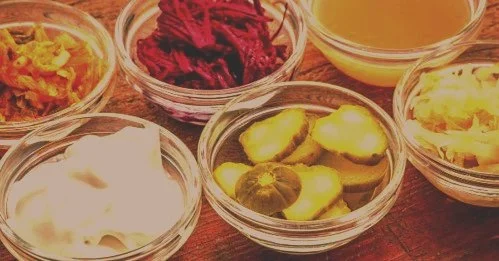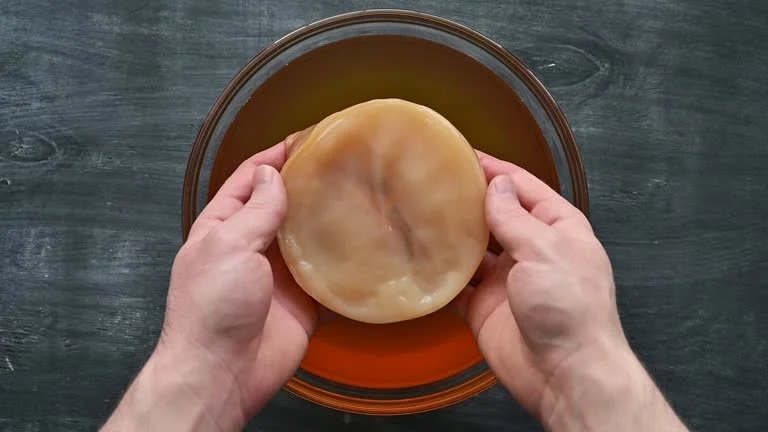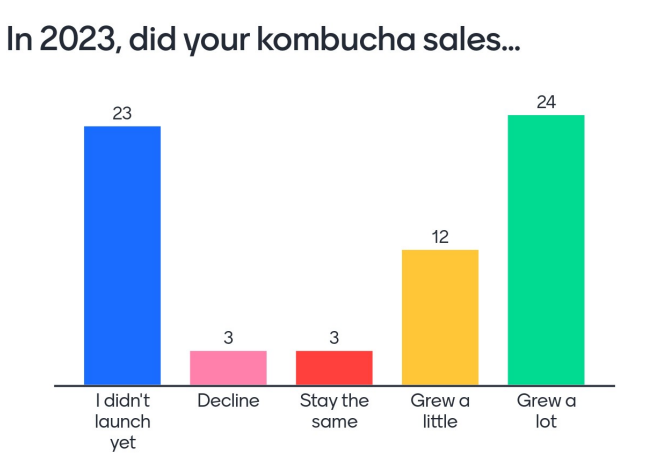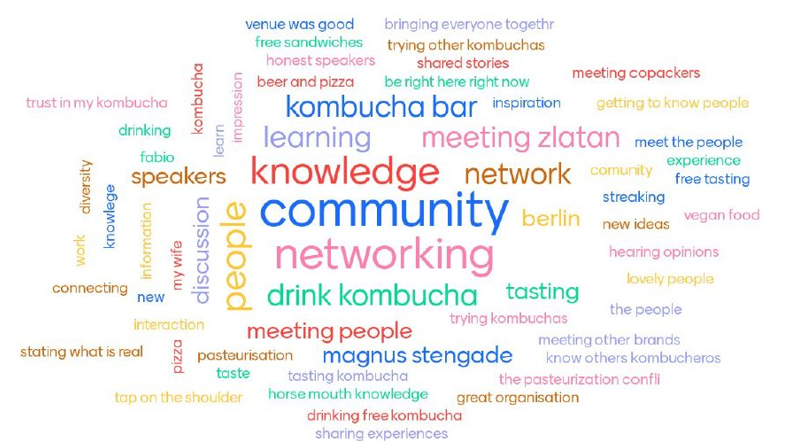Kombucha is loved for its refreshing flavour and perceived health benefits. But how do you manage the challenge of controlling alcohol content?
The Full Sensory Experience: Crafting Sophisticated No/Low Alcohol Functional Beverages
The Hidden Costs of Inconsistent Kombucha Production: Why Stability Pays Off
Fermentation 101 - An Introduction to the Wonderful World of Fermentation
Create A ‘Winning’ Functional Beverage Brand: A Roadmap for Success
What Is Water Kefir?
When we think of ‘kefir’ we likely picture probiotic-rich, gut-friendly dairy products. While milk kefir is well-known and widely consumed in Western diets, there’s another type of kefir that deserves just as much attention: water kefir!
Water Kefir – The Basics
Water kefir is created when water kefir grains are added to a sugar-water solution and left to ferment. Despite the name, these grains are not actual grains but rather a SCOBY (symbiotic colony of bacteria and yeast). Not to be confused with the rubbery, disc-shaped SCOBY used in kombucha, the grains are clusters of micro-organisms encased in a translucent, gelatinous shell and look more like little crystals.
Water kefir grains
During fermentation, the bacteria and yeast in the grains break down the sugar, producing lactic acid, acetic acid, amino acids, vitamins and minerals. Once the fermentation process is complete, the grains are filtered out and the result is a drink that is slightly sweet and tart. Unlike kombucha, which has a more acidic bite, water kefir tends to have a gentler flavour, making it appealing to those who prefer a subtler taste.
The Origins of Water Kefir
Water kefir is known by various names, including tibicos, tibi water, kefir aqua and water crystals, amongst others. While humans have been fermenting food and drinks for thousands of years, there is much more evidence of dairy kefir production and consumption than earlier civilizations’ use of water kefir grains. As a result, its origins are somewhat mysterious but one popular theory suggests that it dates back to Mexico, where these granules, called ‘tibi’, grow at the base of the prickly pear cactus and have been used for centuries in traditional Mexican fermented drinks like tepache.
Different cultures around the globe have also developed their own variations, contributing to the slight differences in the microorganisms found in water kefir grains in different parts of the world but all share very similar approaches and production methods.
What Does Water Kefir Do for Me?
First and foremost, water kefir tastes fantastic. Its subtle sweetness and tartness pairs with an almost endless array of flavours and can be crafted to delight even the most demanding palates.
Growth of the category, like in the wider functional beverages market, has also been driven by increasing numbers of consumers seeking out and choosing drinks that support a healthier lifestyle and diet. Significantly, water kefir contains significantly less sugar and is typically produced using natural ingredients, making it a healthier alternative to more traditional carbonated soft drinks.
In addition to the ‘bad stuff’ water kefir doesn’t contain, fermented food and drinks, including water kefir, can contain micro-organisms and other vitamins, minerals and micro-nutrients as a result of the fermentation process and ingredients used. Its perceived health benefits are thought to result from the blend of micro-organisms, amino acids, organic acids, water-soluble vitamins and a variety of micro-nutrients produced during fermentation.
How Is Commercial-Scale Water Kefir Made?
Brewing water kefir at scale requires careful monitoring of temperature, fermentation time, and hygiene to prevent contamination and ensure consistency and quality. Here’s a simplified breakdown of how commercial water kefir is made:
Dissolving Sugar: Organic sugar is dissolved in hot water in stainless steel tanks.
Fermentation: The sugar water is cooled, and water kefir grains are added. The mixture is left to ferment for 2-5 days.
Packing: After fermentation, the kefir is cooled and filtered before being packaged.
Quality Control: Throughout the process, pH, temperature, and alcohol content are carefully monitored to ensure the kefir remains high-quality and compliant with safety and quality regulations.
While relatively straight-forward to produce compared to other fermented beverages - with the right space, equipment and expertise - there are more convenient solutions available for producer’s looking to manufacture water kefir at commercial-scale. Good Culture’s water kefir base has been developed to simplify the process for our partners and provide a consistent, high-quality and efficient solution for producers and allow them to focus on the what’s most important to any business: growth! Contact us today to find out more how easy it could be to take advantage of the opportunities water kefir offers.
Water Kefir: The Future of Beverages?
A survey conducted by Ipsos in 2018 estimated that about 3% of the world’s population was vegan – a massive 230 million people - and that number is bound to have grown over subsequent years with the explosion in interest of plant-based diets. Add to that that over two-thirds of the world’s population are affected by lactose malabsorption/intolerance and it is certainly no surprise that more and more people, more often, are seeking out and switching to non-dairy/plant-based, functional alternatives to traditional staples and beyond to support their individual health and lifestyle needs.
Water kefir therefore is perfectly positioned to benefit from these seismic shifts in consumer behaviour. Free of diary but perceived to deliver similar benefits to milk kefir, water kefir offers a versatile, mild-tasting, accessible and convenient alternative to milk kefir and other functional beverages.
Thanks to its broad appeal and perceived health benefits, water kefir is now available in more supermarkets around the world than ever. Whether you’re looking for a refreshing soda substitute or a healthier alternative, water kefir is a delicious, positive choice.
Interested in creating your own water kefir business or product range?
Wherever you are on your particular journey, Good Culture is here to support and guide you. At heart, we are passionate about drinks, quality, innovation and the creative pursuit of entrepreneurship. Our mission is to inspire, empower and support you to build thriving, profitable & sustainable businesses. We have built years of experience and expertise by helping companies all around the world create, develop, commercialise and grow their businesses with the supply of the highest quality fermented beverage ingredients, unparalleled commercial and technical support and access to our amazing network of co-packers and flavour developers.
So, are you interested in taking advantage of the opportunities functional beverages offers or have an existing brand and need help taking it to the next level? The amazing team at Good Culture can help with anything you need.
Want to hear how we can help you do kombucha better? Contact us today.
What Is Kombucha?
What is Kombucha?
Kombucha is a naturally fizzy, fermented tea that has been enjoyed by various cultures for over two millennia. Although its roots trace back to ancient China, Japan, and Russia, it has recently gained widespread popularity for its unique taste and potential health benefits. But what exactly is kombucha, and why are so many people hooked on it?
At its core, kombucha is made from just a few simple ingredients:
Tea (usually black or green)
Water
Sugar
S.C.O.B.Y. (Symbiotic Culture of Bacteria and Yeast)
These ingredients combine to create a refreshing, tangy beverage that’s both energizing and nutritious. However, the real magic happens during the fermentation process.
How is Kombucha Made?
The process of making kombucha begins with brewing tea. Sugar is added, which may seem odd for a healthy drink, but it’s actually a crucial part of the fermentation process. The sugar isn’t for you — it’s food for the SCOBY. Once the sweet tea has cooled, the SCOBY is added, and the magic begins.
The SCOBY looks like a jelly-like disc, but don’t let its appearance fool you — it’s the powerhouse behind the fermentation. The bacteria and yeast in the SCOBY break down the sugar and convert it into alcohol, which is then transformed into organic acids. This process creates kombucha’s signature flavour - a mix that is a little sweet, with just the right amount of sour.
Typically made using green or black tea, black tea varieties have a deeper flavour, while green tea kombucha is more delicate and crisp. With its naturally sparkling and light, refreshing and acidic base flavour, it pairs exceptionally well with fruit and root flavours.
Different types of Kombucha available to consumers
As kombucha has hit the mainstream, lots of brands and manufacturers have entered the market and launched products to cater to varying consumer tastes, as well as developing new methods to mitigate the risks inherent in producing kombucha using traditional methods at commercial scale. ‘Traditional’ kombucha remains a favourite amongst large numbers of consumers however ‘craft-style’, ‘mainstream’ and ‘sugar-free’ have landed and grown quickly, encouraging more and more people to try kombucha and what it has to offer. Discover more about the different types of kombucha consumers are buying and enjoying here.
Kombucha and perceived health benefits
Fermented food and drinks can contain micro-organisms and other vitamins, minerals and micro-nutrients as a result of the fermentation process and ingredients used. Kombucha's perceived health benefits are thought to result from the blend of micro-organisms, amino acids, polyphenols from tea, organic acids, water-soluble vitamins and a variety of micro-nutrients produced during fermentation.
While these potential benefits are promising, it’s important to note that very little scientific research has been conducted as to the actual benefits to human health and more research is needed to fully understand kombucha’s long-term effects.
Why Drink Kombucha?
Kombucha offers a unique combination of refreshment and potential wellness in one drink. Its slight fizziness and tart taste make it a great alternative to sugary soft drinks or alcohol. Whether you’re looking to improve your wellbeing, cut back on sugar, or simply enjoy a new beverage with friends, kombucha is a great option.
The Rising Popularity of Kombucha
With global sales topping $3 billion (Source: Euromonitor - 52 w/e 30/12/2023) and predicted kombucha has become a staple to millions of consumers around the world and increasingly available in stores, cafes, restaurants and bars as it reaches mainstream consciousness. With this increasing availability, more and more people will be able to discover and try kombucha and it is expected that the category will continue its strong growth over the coming years.
The Bottom Line
Kombucha is more than just a health drink—it’s a delicious, naturally fermented tea that’s part of a centuries-old tradition. Whether you’re sipping for the potential health benefits or simply because you enjoy the taste, kombucha is a refreshing choice that fits well into a healthy, balanced lifestyle.
Interested in creating your own kombucha business or product range?
Wherever you are on your particular journey, Good Culture is here to support and guide you. At heart, we are passionate about drinks, quality, innovation and the creative pursuit of entrepreneurship. Our mission is to inspire, empower and support you to build thriving, profitable & sustainable businesses. We have built years of experience and expertise by helping companies all around the world create, develop, commercialise and grow their businesses with the supply of the highest quality fermented beverage ingredients, unparalleled commercial and technical support and access to our amazing network of co-packers and flavour developers.
So, are you interested in taking advantage of the opportunities functional beverages offers or have an existing brand and need help taking it to the next level? The amazing team at Good Culture can help with anything you need.
Want to hear how we can help you do kombucha better? Contact us today.
Exploring The Different Types of Kombucha Available to Consumers in Today's Market
Kombucha Industry Survey Results from Kombucha Summit 2023
The Kombucha Summit held in Berlin, Germany, from Nov 17-18, culminated with a compelling ‘Live Kombucha Industry Survey’ led by presenter Denis Kelleher, CEO of Good Culture Kombucha.
Over 70 of the 100+ attendees in the room took the opportunity to participate, using their phones to connect to the Mentimeter live polling program. Around 40% of responses were from established kombucha brands, with 30% in start-up mode and another 30% who had not yet launched.
The results – displayed in real-time – highlighted a range of concerns illustrated by charts, word clouds, and a host of statistics. They provide an intriguing glimpse into the aspirations and apprehensions of these producers as 2023 draws to a close.
Optimism
This was an optimistic crowd who had a positive experience of the business. A resounding 60% reported that 2023 had been a good year, marked by substantial growth, while less than 10% observed stagnant sales. Looking forward, everyone expected 2024 to be a better year, with 64% expecting significant growth and the remainder anticipating some level of improvement.
The attendee’s excitement for the coming year is encapsulated in a word cloud – the larger the word, the more responses.
Terms like ‘growth’ and ‘new products’ feature prominently. Brands expect to sell to new customers, increase market share, diversify, innovate, and create amazing flavors.
Concerns
Beneath the overarching optimism, there lay a spectrum of concerns. The attendees were asked to weigh these on a 1-10 scale. The responses highlight the divergence in issues that keep them awake at night.
While the overall graph indicates a particular trend, a deeper analysis reveals some fascinating divergence of opinion. Notably, shelf stability was less concerning than any other topic. Indeed, 20% had zero concern with the issue. Opinions about excess alcohol lie at either end of the spectrum. While 20% had zero concern, an equal number ranked this as the most concerning. People were only mildly concerned with achieving product consistency, with few extremes at either end. It was much the same story with production capacity. It was no surprise that over half were concerned about costs in a period of widespread inflation.
Pasteurization
One way to control alcohol levels and deliver a shelf-stable product is to pasteurize kombucha and thus stop fermentation. When asked how much they agreed with issues about pasteurized vs. unpasteurized kombucha, these attendees exhibited a nuanced perspective that suggests a considerable – some might say surprising – openness toward exploring pasteurization as a viable approach.
Most striking, over 60% of attendees think pasteurizing would help grow their business, and less than half think kombucha should only be raw and living. Balanced against these views, few people thought raw kombucha was risky, and even fewer were indifferent.
We can only speculate about the implications of this data. The survey did not ask how many brands already sold pasteurized products. We can assume it is a minority. So, the survey might be seen as probing for their views on the consumer acceptance of this issue. Since there is no labeling requirement to declare the production process, consumers are unaware of the risks or benefits of raw and living vs. pasteurized kombucha.
Kombucha Summit Experience
A last slide to consider is the word cloud created by people expressing their favourite things about the Summit.
Clearly, a chance to be part of a community of producers, share knowledge, network, and meet people was high on the list. However, it was the range of other benefits that showed why attending an event like this was worth time away from their business. From sampling other kombucha to sharing opinions and sitting in presentations, the Summit was a unique opportunity for all.
Looking ahead, The Kombucha Summit hopes to attract an even broader spectrum of producers to KS24 next year in Berlin – offering a unique opportunity for learning, networking, and industry insights.
This blog was kindly written by Ian Griffin from Booch News

















